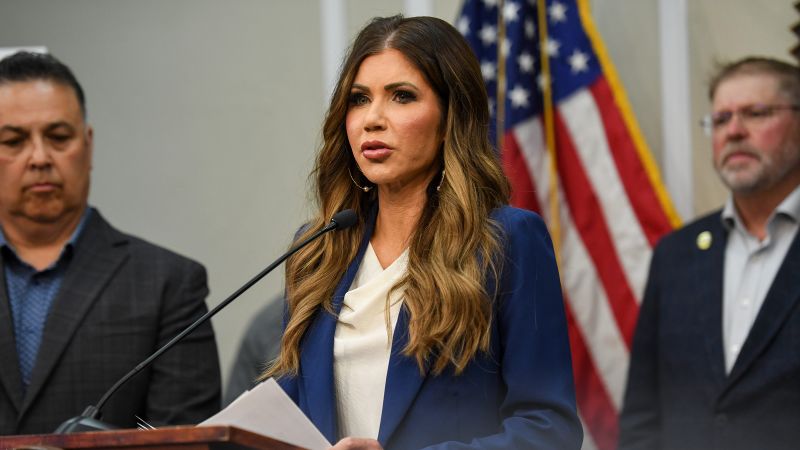All nine indigenous tribes in South Dakota have voted to ban Governor Kristi Noem from their lands. The Flandreau Santee Sioux Tribe executive council made the decision to bar the Republican governor from its reservation, following a contentious meeting where some members vocalized their opposition. The president of the tribe informed Noem that a ban was imminent due to her offensive comments about tribal leaders profiting off drug cartels and prioritizing them over their own communities. This decision was made in solidarity with other tribes who have also voted to prevent Noem from setting foot on their land.
Noem’s comments about Mexican drug cartels being rampant on Native American reservations in South Dakota ignited a wave of tribes denouncing her and voting to bar her from their lands. The Flandreau Santee Sioux Tribe, along with other tribes in the state, had been under pressure from local citizens to take action in response to Noem’s remarks. Despite the bans, Noem stated in a response to CNN on Wednesday that she hopes to work with tribal leaders going forward to address challenges faced by Indian Country and focus on solutions for safer communities and declining addiction numbers.
In addition to the Flandreau Santee Sioux Tribe, the Sisseton Wahpeton Oyate Tribe, Yankton Sioux Tribe, Standing Rock Sioux, Crow Creek Sioux, Rosebud, Cheyenne River Sioux, Oglala Sioux, and Lower Brule Sioux tribes have all voted to bar Governor Noem from reservation land. These votes came in the midst of national attention on Noem over anecdotes from her recently released book, where she described killing her dog and an unnamed goat, as well as meeting with North Korean dictator Kim Jong Un and cancelling a meeting with French President Emmanuel Macron. Criticism of Noem has grown as some of these anecdotes have been disputed by officials.
Noem’s standing in the political arena has faced challenges in the wake of controversy surrounding her book and comments. Despite this, she has continued to emphasize the importance of border security and has warned of an “invasion” of immigrants at the Southern border between Texas and Mexico. Noem has scheduled press conferences about border security and its impact on South Dakota, while stating that bans against her do not address the root cause of the issues she believes are affecting the state.
Governor Noem, along with other top South Dakota officials, has announced new programs to support tribal law enforcement in the state. This includes a certification program to streamline training for local law enforcement and the appointment of Algin Young as South Dakota’s Tribal Law Enforcement Liaison. Despite the bans from indigenous tribes, Noem has been focused on addressing issues of border security and drug trafficking in the state, highlighting the efforts of the South Dakota National Guard in supporting these initiatives.


